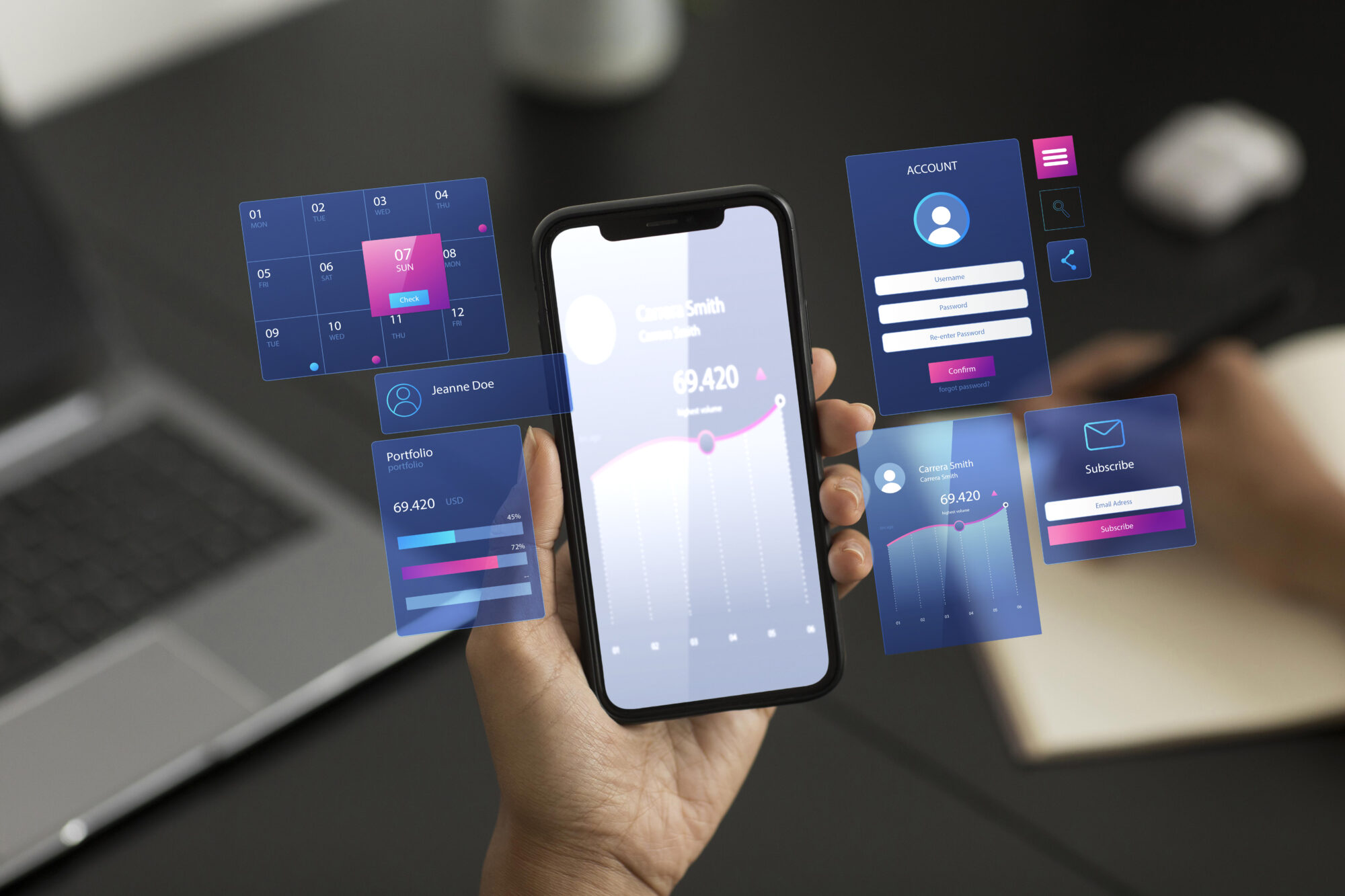Gone are the days when having a mobile app was just a “nice to have” for businesses. In 2025, if you’re running a business without a mobile app, you’re essentially handing your competitors a massive advantage on a silver platter. Let me break down exactly why every business—from local coffee shops to multinational corporations—needs to prioritize mobile app development this year.
The Mobile-First World We Live In
Here’s the reality check: people spend over 7 hours a day on their mobile devices, and nearly 90% of that time is spent within apps, not browsing websites. Your customers aren’t just mobile-first anymore—they’re mobile-only in many cases. When someone needs a service or product, they’re reaching for their phone and opening an app, not firing up a desktop computer.
The shift has been so dramatic that businesses without apps are becoming invisible to entire customer segments. It’s like having a store with no front door—people know you exist, but they can’t easily get to you.
1. Customer Experience That Actually Converts
Mobile apps deliver a fundamentally different user experience compared to mobile websites. Apps load faster, work offline, remember user preferences, and integrate with device features like cameras, GPS, and push notifications. This isn’t just about convenience—it’s about creating friction-free experiences that actually convert browsers into buyers.
Think about it: when was the last time you completed a purchase on a mobile website versus in an app? Apps consistently outperform mobile websites in conversion rates by 3-5x, simply because the experience is smoother and more intuitive.
2. Direct Marketing Channel That Cuts Through the Noise
Email marketing has an average open rate of about 20%. Social media organic reach keeps plummeting. But push notifications from mobile apps? They have an average open rate of 90% and a click-through rate of around 40%. That’s not a typo—apps give you direct access to your customers’ attention in a way that no other marketing channel can match.
With an app, you’re not competing with algorithms or hoping your message doesn’t end up in spam folders. You’re communicating directly with customers who have already shown interest in your business by downloading your app.
3. Brand Visibility and Top-of-Mind Awareness
Your app icon sits on your customers’ home screens alongside apps they use daily like Instagram, Netflix, and their banking apps. That’s prime real estate that keeps your brand visible 24/7. Every time they unlock their phone, they see your brand. This constant visibility translates into top-of-mind awareness when they need your products or services.
It’s psychological marketing at its finest—the mere exposure effect means people develop preferences for things they see frequently, even if they don’t consciously register seeing them.
4. Competitive Advantage in Saturated Markets
In 2025, standing out in crowded markets requires more than good products and competitive pricing. Apps give you multiple ways to differentiate:
- Loyalty programs that actually work: Apps make it easy to implement and manage loyalty programs that keep customers coming back
- Personalized experiences: Use customer data to provide tailored recommendations and offers
- Exclusive app-only deals: Create incentives for app downloads and usage
- Superior customer service: In-app chat, quick reorders, and account management create better service experiences
5. Data Collection and Customer Insights
Apps generate incredibly valuable first-party data about customer behavior, preferences, and usage patterns. This data is gold for making informed business decisions, improving products, and creating targeted marketing campaigns. Unlike website analytics, app data shows you exactly how customers interact with your business in real-time.
With privacy regulations tightening and third-party cookies disappearing, having your own data source becomes crucial for sustainable marketing and growth strategies.
6. Revenue Diversification and Growth Opportunities
Apps open up new revenue streams that weren’t possible before:
- In-app purchases: Sell digital products, premium features, or upgrades
- Subscription models: Create recurring revenue with app-based subscription services
- Sponsored content: Partner with complementary businesses for in-app advertising
- Enhanced upselling: Use customer behavior data for strategic upselling opportunities
7. Operational Efficiency and Cost Reduction
Well-designed apps can significantly reduce operational costs by automating routine tasks:
- Customer service inquiries drop as apps provide self-service options
- Order processing becomes more efficient with integrated payment systems
- Appointment booking and management can be fully automated
- Customer onboarding processes become streamlined
Many businesses see 20-30% reductions in customer service costs after launching apps that handle common customer needs automatically.
The Technology Barrier Has Disappeared
The biggest game-changer in 2025 is that creating professional mobile apps no longer requires massive budgets or technical teams. Platforms like App builder have democratized app development, allowing businesses to create fully-functional apps without coding knowledge or six-figure development budgets.
Similarly, solutions like AppBuilder24 make it possible to go from concept to published app in weeks rather than months, with drag-and-drop interfaces that put app creation within reach of any business owner.
Building Trust in a Digital World
In our data-driven economy, customers are becoming more conscious about where they share their information. Having your own app signals legitimacy and professionalism in ways that social media presence alone cannot match. Apps also provide better security frameworks for protecting customer data, which builds trust and credibility.
Customers are more likely to provide personal information and complete transactions with businesses that have invested in professional app experiences rather than just basic websites.
Real-World Success Stories Across Industries
Restaurants: Apps with mobile ordering have increased average order values by 25-35% while reducing wait times and improving customer satisfaction.
Retail: Fashion brands with apps see 2-3x higher customer lifetime values compared to web-only customers.
Services: Home service companies with booking apps report 40% more repeat customers and significantly higher review ratings.
Healthcare: Medical practices with patient apps have reduced no-shows by up to 60% and improved patient engagement scores.
The Cost of Waiting
Every month you delay app development is money left on the table. Your competitors who launch apps first will:
- Capture more customer attention and loyalty
- Benefit from better customer data and insights
- Establish themselves as industry innovators
- Build larger, more engaged customer bases
The businesses that moved early into e-commerce dominated their industries. The same pattern is happening with mobile apps right now.
Getting Started: Your Action Plan
Step 1: Audit your current digital presence and identify gaps where an app could improve customer experience.
Step 2: Define your app’s primary purpose—customer acquisition, retention, service delivery, or sales.
Step 3: Choose the right development approach for your budget and timeline. Modern app builders make this more accessible than ever.
Step 4: Plan your launch strategy with existing customers to build initial traction.
Step 5: Use app analytics to continuously improve and expand functionality based on user behavior.
The Bottom Line
Mobile apps aren’t the future of business—they’re the present. In 2025, not having an app is like not having a website was in 2005. Your customers expect it, your competitors are doing it, and the technology barriers have never been lower.
The question isn’t whether your business needs an app. The question is how quickly you can get one launched and start reaping the benefits of direct customer relationships, increased engagement, and new revenue opportunities.
Your customers are on their phones right now. Shouldn’t your business be there with them?
Ready to join the mobile-first economy? The tools and platforms exist today to get your business app-ready faster and more affordably than ever before. The only question left is: what’s holding you back?



































